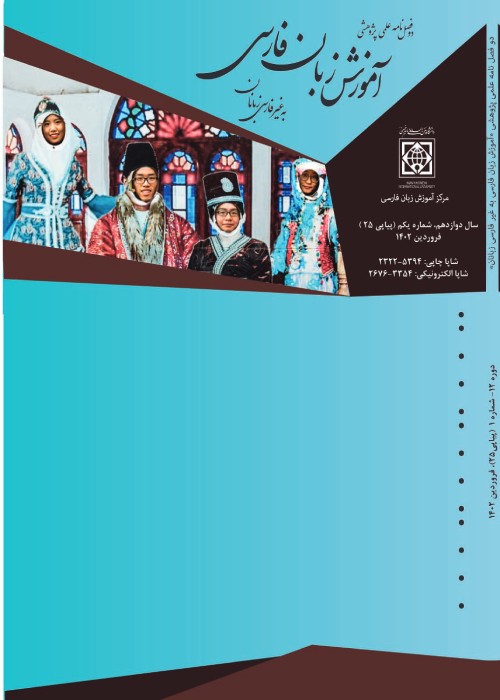Persian and English Multiple Wh-questions in Contrast: A Study of Binary, D-linked, and Ternary Multiple Wh Questions
In Chomsky’s Government and Binding theory, a number of parameters have been the subject of a plethora of investigations. One of the parameters of UG which has received attention of linguists in the past decade or so is the wh-parameter. In addition to the variation between languages with respect to single wh-questions (i.e. wh-movement vs. wh-in-situ), it has been noted that languages also differ in the way they produce multiple wh-questions (MWQs). In English MWQs, there is a single strict constraint on the movement of wh-elements known as the Superiority effect, where the wh-phrase that C-commands the other moves to Spec-CP. In contrast, Persian is a language with a productive scrambling property, which demonstrates two basic strategies for the formation of MWQs: (i) multiple wh-in-situ, where wh-elements are not subject to the Superiority effect, (ii) optional multiple wh-fronting with multiply filled specifiers (i.e. [+MFS]), where wh-words are bound to the Superiority effect. There are specific conditions under which the violation of the Superiority effect in English MWQs disappears, and their ungrammaticality is ameliorated: D(iscourse)-linking and ternary (non-binary) wh-questions. As the overarching goal of the study, this paper examines the distributional pattern of wh-elements in Persian and English multiple wh-questions (MWQs) based on a Grammaticality Judgement (GJ) task administered to Persian speakers of English (PSEs) and native speakers of Persian (NSEs). More specifically put, the study intends to answer the two research questions: (i) How do native speakers of Persian distinguish among the six types of wh2 elements in Persian binary multiple whquestions (MWQs)?, and (ii) Are there any grammaticality differences between English native speakers’ ratings of English binary, D-linked and ternary MWQs and Persian native speakers’ ratings of translationequivalent Persian binary, D-linked and ternary MWQs? Since the purpose of the present study was to simply characterize Persian speakers’ and native English speakers’ syntactic knowledge at one particular time, a one-shot design was used. Two groups of participants were included in the current study: (1) a group of native speakers of English (NSEs) and (2) a group of Persian speakers of English (PSEs). The NSE group included a pool of 30 American university students and professors who participated in the study through completing an online Google Docs version of the GJ task. Two types of tests were employed in the study: (i) an English GJ task which sought to obtain the judgements of native speakers of English (NSEs) as well as Persian speakers of English (PSEs) on three components investigating English MWQs: 30 binary MWQs, 15 D-linked MWQs, and 15 ternary MWQs, and (ii) a translation-equivalent Persian Grammaticality Judgment (GJ) task. Persian speakers of English (PSEs) took the two tests, but native speakers of English (NSEs) only took the English GJ task. The items pertaining to the Superiority effect in 30 binary MWQs examined the participants’ judgments on different combinations of the first wh-element (Wh1) and the second wh-element (Wh2) in multiple wh-questions (e.g. <who, what>, <what, where>, <where, what>, and <when, what>, etc.). Also, in order to investigate NSEs’ as well as PSEs’ knowledge of the ameliorated Superiority violations, two other components were included in the English GJ task: 15 D-linked MWQs and 15 ternary MWQs, which were the D-linked/ternary equivalents for the 15 ungrammatical binary MWQs. The goal of these two components was to explore whether NSEs and PSEs considered the D-linked (e.g. Which book did which person buy?) and ternary MWQs (e.g. What did who give to whom?) more grammatical in comparison with their binary counterparts (e.g. *What did who buy?). The data were analysed using hierarchical cluster analysis, and grammatical and ungrammatical MWQs were sharply distinguished into separate clusters in the resulting dendrogram. The results of the first research question revealed that Persian MWQs are divided into two major clusters in the relevant dendrogram: 19 grammatical ordered pairs, and 11 ungrammatical ordered pairs. Although Persian resists a neat classification of the six types of wh-elements with regard to the Superiority effect, the 7 ordered pairs <who, what>, <who, where>, <who, when>, <what, where>, <what, when>, <where, what>, and <when, what>, which were considered grammatical in English, are equally deemed grammatical by Persian speakers. The results of the second research question showed significant differences in terms of the grammaticality of Persian/English binary and ternary MWQs, while there is generally no significant difference between NSEs’ ratings of English D-linked MWQs and PSEs’ ratings of the translationequivalent Persian D-linked MWQs. The results of the study have pedagogical implications for teaching Persian to non-native speakers of Persian in terms of the order of teaching different types of Persian MWQs, the contexts for the use of such structures, and the proficiency level at which Persian MWQs could be taught to non-native speakers of Persian.
- حق عضویت دریافتی صرف حمایت از نشریات عضو و نگهداری، تکمیل و توسعه مگیران میشود.
- پرداخت حق اشتراک و دانلود مقالات اجازه بازنشر آن در سایر رسانههای چاپی و دیجیتال را به کاربر نمیدهد.


